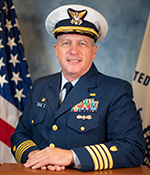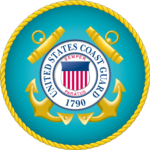

Captain Keith M. Donohue
Commander, Sector Houston-Galveston
U.S. Coast Guard
Captain Keith M. Donohue assumed the duties of Commander, Sector Houston-Galveston in June of 2023. In this position he serves as Captain of the Port, Officer-in-Charge of Marine Inspection, Federal Maritime Security Coordinator, and Federal On-Scene Coordinator. He oversees all maritime safety, security, environmental protection, search and rescue, emergency response, waterways management, regulatory compliance, and contingency planning for all U.S. navigable waterways from the east bank of the Colorado River in Southwest Texas to 60 miles east of Lake Charles, Louisiana, and 200 miles offshore. This area of responsibility encompasses: the Houston Ship Channel and Golden Triangle Port Complexes; the Ports of Freeport, Galveston, Texas City, Houston, Beaumont, Port Arthur, and Lake Charles; 247 miles of Gulf Intracoastal Waterways; four of the nation’s top ten largest refineries; three of the nation’s four Strategic Petroleum Reserve facilities; six of the top 25 busiest ports in the U.S., the fourth busiest cruise ship port in the U.S.; two military outload ports; and the fifth largest container terminal in the U.S.
His previous operational assignments include Deputy Sector Commander at Sector Houston -Galveston; Deputy Sector Commander at Sector Long Island Sound; Commanding Officer of the Pacific Strike Team; Response Department Head at Marine Safety Unit Port Arthur Texas; as well as Facility Branch Chief, Marine and Environmental Protection Branch Chief, and Investigations Officer at Marine Safety Office Providence, Rhode Island. His staff assignments include serving as: a consultant for the United Nations and International Maritime Organization at the Regional Marine Pollution Emergency Information and Training Center for the Wider Caribbean Region, in Curaçao; an International Port Security Liaison Officer attached to Activities Europe in the Netherlands; and an Environmental Specialist in the Operating and Environmental Standards Division of USCG Headquarters. He has overseen responses and deployments to major oil spills, hazardous material releases, natural disasters and exercises throughout the U.S.A., Southeast Asia, Pacific Oceania, and Wider Caribbean; assisted governments of the Caribbean and South America with ratifying and implementing international maritime conventions; and worked with U.S. embassies and foreign governments throughout Europe, Africa, and the Middle East to implement the International Ship and Port Security Code. While serving at USCG Headquarters from 2003 to 2007, he also coordinated the implementation of the first U.S. Mandatory Ballast Water Management Program and was an Oil and Hazardous Material Response (ESF#10) watch-stander at Federal Emergency Management Agency’s National Response Coordination Center for national-level contingencies and exercises.
He holds a Master of Arts in Marine Affairs from the University of Rhode Island, and a Bachelor of Science Degree in Chemical Oceanography from Florida Institute of Technology. He is a certified Type 1 Incident Commander, Incident Command System Instructor, a trained Facility Security Officer, Safety Officer, and a Master Exercise Practitioner. His personal awards include five Meritorious Service Medals, five Coast Guard Commendation Medals, two Coast Guard Achievement Medals and two Humanitarian Service Medals.
